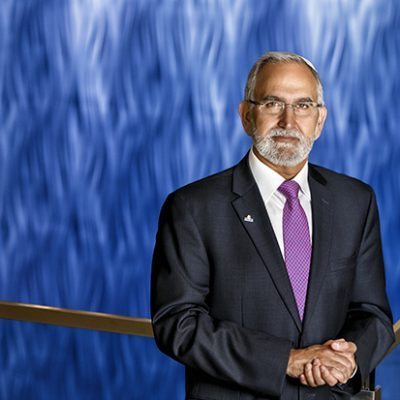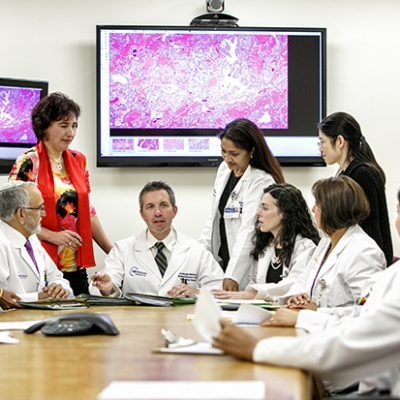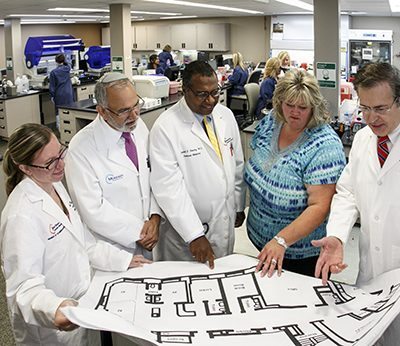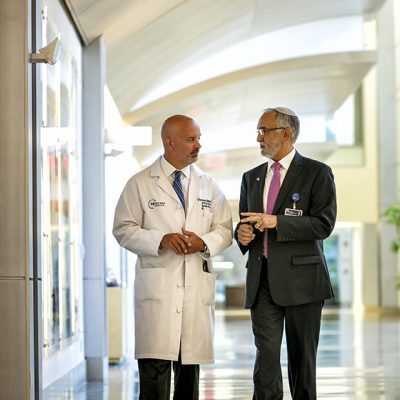
For cancer patients, Meridian Health’s multi-disciplinary, team-focused approach is a “game changer,” according to its medical director
by Jessica Jones-Gorman • Photos By Amessé Photography
In 2011, when Meridian Health set out to expand and enhance its well established and trusted cancer care services, the hospital system hired Dr. Mark Krasna, a nationally accredited physician who had played a significant role in structuring cancer treatment in health care facilities across the country.
Together with Meridian’s existing oncology team, Krasna worked to bring a higher level of care close to home by reorganizing and enhancing how care is delivered in the region. Five years later, all Meridian affiliated hospitals have been granted the American College of Surgeons Commission on Cancer accreditation with commendation for their cancer programs, an achievement earned by less than one-third of all such programs across the country. It is also the first health system in New Jersey to be recognized as an Integrated Network Cancer Program.
“We wanted to bring all of the latest treatments under one roof and organize a multi-disciplinary, very personalized approach to each and every case that we encounter,” noted Dr. Krasna, who currently serves as Meridian Cancer Care’s medical director. “I think that’s exactly what we’ve been able to accomplish.”
Meridian currently offers cancer services across six of its hospital and health village locations—its treatments include chemotherapy, radiation therapy, Cyberknife therapy, minimally invasive surgery, and more than 100 oncology clinical trials, augmented with nurse navigation and survivorship services, genetic counseling, and social work.
“We feature all of the newest technology for breast cancer evaluation and treatments, state-of-the-art imaging and screening mammography, and image guided biopsies,” Krasna said. “We also have new navigational bronchoscopic equipment, which is a major innovation for lung cancer patients, as well as stereotactic radiosurgery at all of our facilities…and we use onboard imaging to check each day or each week to see if a tumor is shrinking.”
Meridian Cancer Care also makes use of Precision Medicine, an innovative trial that uses a process known as genomic analysis to identify abnormal changes in the genetic make-up of the cancer. The clinical trial aims to tailor or “personalize” treatment for patients who have failed previous treatment options or have a rare and/or aggressive form of the disease.
“We know that the majority of cancers have some sort of genetic signature which essentially defines how they are going to behave,” Krasna said. “After years of mapping different tumors, collecting specimens, and analyzing them, we have been able to compare genetic maps and come up with similarities and patterns that will help predict how a patient will do.”
Precision Medicine can also help doctors determine whether or not a patient may be eligible for a drug they might not have thought to offer in the past.
“It’s a game-changer, because this technology, coupled with the expertise of our clinical investigators and partner [Rutgers Cancer Institute of New Jersey], enables us to move beyond a ‘one size fits all’ approach when it comes to treatment options,” Krasna said. “When a physician feels they have a patient who would be appropriate for a trial, a tissue sample is sent for pathology, and once abnormalities are identified, the findings are discussed at a weekly Molecular Tumor Board, which is comprised of clinicians, basic scientists, systems biologists, and those with computational expertise. The team can then decide quickly if the sequencing results suggest new therapy options, which could include treatment with a drug already approved to treat other cancers or diseases, or treatment with a new drug being tested as part of another clinical trial.”
For Dr. Krasna, who has dedicated much of his career to fighting the disease, these developments are revolutionary.
“I guess I was one of those people who knew I wanted to be a doctor from a very young age,” he said. “My dad was a pediatric surgeon who took care of babies at Rutgers for many years, so I was exposed to medicine and surgery even as a child.”
He followed in his father’s footsteps, and attended medical school at Tel Aviv University’s Sackler School of Medicine, completed his internship at Tel Hashomer Hospital, a residency at UMDNJ Robert Wood Johnson Medical School, and his fellowship at Harvard New England Deaconess Hospital.
“I went into medicine thinking I would be a pediatric heart surgeon like my dad, but when my son was born in the 1980s, I was working at Boston Children’s Hospital. It was a very exciting opportunity, but there was a 20 percent mortality rate, which was completely heart wrenching. I would come home from work at 2 a.m., pick my son up out of his crib to make sure he was still breathing, and rock with him until the sun came up. My wife simply told me, ‘You can’t do this for the rest of your life.’”
So, Krasna shifted gears and focused on thoracic surgery, placing an emphasis on lung and esophageal cancer procedures. After practicing for two decades and assisting his hospital in building up its cardiac and thoracic programs, he was tapped by St. Joseph’s Towson Cancer Institute.
“There, we developed the first multi-disciplinary lung cancer center in the country; it was in the early 1990s, so it was truly revolutionary,” Krasna recalled. “Patients would come in and it was a one-stop shop. All of the hospital’s specialties would meet together and discuss every single case. It wasn’t just a meeting of the minds; we would meet and see patients together, discuss, and then outline the progress of care. It became my passion and really launched a solid focus for my career.”
When he arrived at Meridian in the fall of 2011, his first goal for its evolving cancer program was team building.
“We have nine disease sites, so we looked at each one, identified strengths and obstacles, and recruited accordingly,” said Krasna. “We added disease-specific nurse navigators, recruited seasoned docs like Tom Bauer for lung cancer, Ghulam Abbas for thoracic, Denise Johnson Miller for breast, and Ken Newkirk for head and neck cancer. We really went through an aggressive search, looked for the most esteemed academic backgrounds, and dove straight into clinical trials and translational research.”
The team also focused on multi-disciplinary conferences, which Krasna advocates as the best route of treatment for both patients and doctors.
“Cancer is no longer able to be treated by one physician. It is a team sport now,” he explained. “We’ve reached a point where 90 percent or more of women with breast cancer and 90 percent or more of patients with lung cancer are treated with surgery and chemo, or surgery and radiation therapy, not just surgery alone. The whole team agrees on the best course of treatment, which has really raised the bar in terms of quality.”
Several enhanced and expanded cancer centers throughout Meridian are slated for completion in the next 18 months, all state-of-the-art facilities where patients can easily navigate every aspect of care in one space.
“Patients will simply have to go to one location to attend to all of their different appointments,” he added. “I think patients need that sense of oneness…that, ‘This is where my team lives’ feeling.”
Fourteen disease-specific nurse navigators will also lead each patient through their journey. (“In our system, they are the glue that keeps the team together,” the doctor said.)
A tissue bank is also slated to open within the next year, allowing Meridian to perform its own research.
“It’s a very exciting development that will allow us to create unique partnerships and participate in early-phase clinical trials,” said Krasna.
“For me, the most exciting part of Meridian Cancer Care is seeing physicians from all different specialties and backgrounds coming together and embracing the multi-disciplinary approach to care,” he concluded. “On any given week, we will have as many as 11 multi-disciplinary conferences going on, and I have not been to a single tumor conference in over two years in which we did not have full representation—meaning every single one of our specialties is represented. We are bringing together the best and the brightest, the most expert, knowledgeable, and caring doctors and nurses. And they are truly making a difference in each and every one of our patients’ lives.”
Meridian Cancer Care
800.560.9990 / meridianhealth.com







